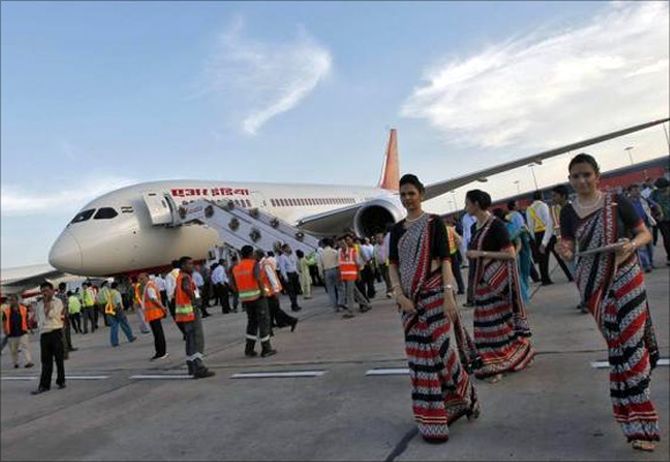The government is planning to liberalise the terms and conditions for the sale of the national carrier. The Centre is still pursuing the option of selling the airline’s subsidiaries before the airline itself, in order to deal with an outstanding debt of around Rs 27,000 crore.

The government would soon reconstitute a group of ministers charged with Air India’s privatisation decisions, following which the Centre plans to start the process of taking another shot at selling the national carrier, by issuing a new expression of interest.
In Prime Minister Narendra Modi’s first term, the Air India-Specific Alternative Mechanism (AISAM), as the group of ministers is known, comprised then Finance Minister Arun Jaitley, Road Transport Minister Nitin Gadkari, Commerce and Civil Aviation Minister Suresh Prabhu and Rail Minister Piyush Goyal.
With Jaitley and Prabhu no longer a part of Modi’s Cabinet, the AISAM will be reconstituted to include the current Finance Minister, Nirmala Sitharaman, and Civil Aviation Minister Hardeep Singh Puri, Business Standard has learnt.
Gadkari and Goyal are expected to stay on in the group.
As the senior-most minister, Jaitley headed the AISAM since its formation in July 2017.
If Gadkari continues to be part of the AISAM, he will be the senior-most minister.
“The AISAM will be reconstituted very soon. Its first job will be to give clearance to the new expression of interest (EoI) for potential bidders for Air India.
"The EoI is nearly ready and will be put out in public once the group gives its go-ahead,” said a government official.
As reported earlier, the government is planning to liberalise the terms and conditions for the sale of the national carrier.
The changes would allow a potential buyer to go for a stake sale of the airline immediately after acquiring it.
The revised norms would also enable merger or reverse merger of Air India with any existing business of the buyer.
At least 95 per cent stake of Air India will be up for sale; 5 per cent will be retained for the employee stock option.
This is the first time the government will relax rules for strategic disinvestment, meant to prevent asset stripping.
The relaxation of the rules was proposed by transaction advisor EY as multiple entities during the last sale process in 2017 had objected to them, saying they restricted the bidder from raising capital from the market and developing synergy with an existing business.
The Centre is still pursuing the option of selling the airline’s subsidiaries before the airline itself, in order to deal with an outstanding debt of around Rs 27,000 crore.
At the last year’s auction, the government had decided to retain 24 per cent in the airline, which was one of the key reasons why it failed to generate interest among potential buyers.
No one had expressed interest in Air India, forcing the government to call off the sale.
The AISAM is charged with giving approvals at every step of the Air India divestment process, with only the blanket approval given by the Union Cabinet.
Photograph: Adnan Abidi/Reuters











 © 2025
© 2025